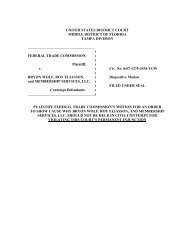HELO RCPT TO QUIT MAIL FROM DATA - Federal Trade Commission
HELO RCPT TO QUIT MAIL FROM DATA - Federal Trade Commission
HELO RCPT TO QUIT MAIL FROM DATA - Federal Trade Commission
You also want an ePaper? Increase the reach of your titles
YUMPU automatically turns print PDFs into web optimized ePapers that Google loves.
Dissenting Statement of <strong>Commission</strong>er Jon Leibowitz<br />
Dissenting Statement of <strong>Commission</strong>er Jon Leibowitz<br />
In Re: CAN-SPAM ADV Labeling Report<br />
Requiring commercial email to be labeled is not a panacea but, as the CAN-SPAM Act<br />
clearly recognizes, there is no single bullet theory for solving the spam problem. An ADV<br />
labeling requirement could be a modest tool to empower consumers to filter and sort commercial<br />
emails – to read them later, evaluate them individually, or delete them in bulk if they choose<br />
– and for that reason I respectfully dissent from the majority and urge Congress to consider a<br />
labeling requirement.<br />
The Report confuses a principal purpose of the CAN-SPAM Act – to attack fraudulent and<br />
deceptive spam – with the sine qua non of the ADV amendment, to create a convenience tool for<br />
consumers. Indeed, the legislative history of CAN-SPAM makes clear that the report provision<br />
was largely intended to spur the <strong>Commission</strong> to study the use of the ADV label for commercial<br />
emailers that supply accurate header and address information – not for those sending fraudulent<br />
or misleading commercial messages. Senator Schumer, speaking at the <strong>Commission</strong>’s own Spam<br />
Forum about his mandatory ADV labeling proposal – one that served as a basis for the provision<br />
that ultimately was enacted – stated that the provision would require “all commercial email”<br />
to have “ADV” in the subject line, indicating that it contains commercial content. Senator<br />
Schumer, Speech at FTC Spam Forum (April 30, 2003), at 172 (emphasis added). Senator<br />
Corzine, introducing the amendment calling for the ADV study, noted that the FTC Report was<br />
to consider how to require “all unsolicited commercial email to be identifiable from its subject<br />
line.” 108 th Congress, Cong. Rec. S13041 (daily ed. Oct. 22, 2003) (statement of Senator<br />
Corzine) (emphasis added). He believed that the labeling requirement would not only help<br />
reduce the amount of spam but “give individuals and ISPs considerable power to keep spam out<br />
of their in boxes.” Id. Senator Wyden spoke in support of Senator Corzine’s amendment during<br />
floor debate, confirming his understanding that the labeling would apply to “every unsolicited<br />
email.” Id. (statement of Senator Wyden). He recognized that “the question about making<br />
sure every unsolicited email has ADV has been contentious” in light of the costs that would be<br />
imposed on businesses, but supported the requirement that the <strong>Commission</strong> should at least study<br />
the idea. Id.<br />
Legislators in the House, while focused less on the ADV provision, acknowledged the<br />
broad scope of CAN-SPAM. House Judiciary Committee Chairman Sensenbrenner declared<br />
that CAN-SPAM would give consumers “more information and choices to stop receiving all<br />
forms of unwanted commercial email.” 108 th Congress, Cong. Rec. H12860 (daily ed. Dec. 8,<br />
2003) (statement of Representative Sensenbrenner). House Energy and Commerce Committee<br />
Chairman Tauzin, in a joint statement with Ranking Member Dingell, stated that CAN-SPAM<br />
would not only “prohibit certain predatory and abusive practices used to send commercial<br />
email,” but also “provide consumers with the ability to more easily identify and opt-out of<br />
receiving other unwanted commercial email, and to give such opt-outs the force of law.” 108 th<br />
Congress, Cong. Rec. E73 (Jan. 28, 2004 extensions of remarks) (statement of Representative<br />
Tauzin).<br />
1

















